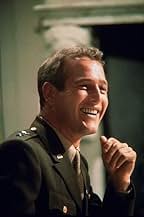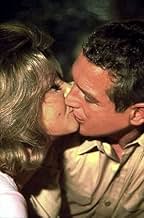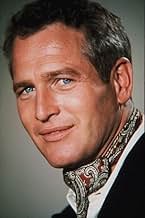IMDb RATING
6.3/10
1.9K
YOUR RATING
In 1943, a group of captured Allied brigadier generals cannot agree on an escape plan. Allied headquarters develops a plan to send in an escape artist to be captured himself so he can coordi... Read allIn 1943, a group of captured Allied brigadier generals cannot agree on an escape plan. Allied headquarters develops a plan to send in an escape artist to be captured himself so he can coordinate the generals escape.In 1943, a group of captured Allied brigadier generals cannot agree on an escape plan. Allied headquarters develops a plan to send in an escape artist to be captured himself so he can coordinate the generals escape.
Charles Gray
- General Cox-Roberts
- (as Charles D. Gray)
Paul Gleason
- Stockade Inmate
- (uncredited)
Featured reviews
This must be the equivalent to WW2 escape movies as was the original '67 Casino Royale was to spy movies. i.e incoherent, non-sensical, long, pantomime acting and with no apparent plot.
But, Boy! It is ridiculously entertaining, in a Pink Panther-ish way. Throw your preconceived ideas about Paul Newman (who looks schoolboyishly slightly, but endearingly, uneasy) the almost 'Allo, 'Allo (old comedy UK hit TV series set in occupied France) scenarios - but this is wartime Italy, making it more glamorous and picturesque.
So, I'm not going to bore you with the details of the cast that includes beautiful women, hammed-up character actors from the UK and elsewhere mixed into a cocktail of chases, gun battles and amusing (rather than hilarious) dialogue.
This is a wet Sunday afternoon movie-on-TV type, but without the slush and if you go make a cup of tea, do a spot of D.I.Y and walk the dog, you can come back into it and you'll be still be entertained.
But, Boy! It is ridiculously entertaining, in a Pink Panther-ish way. Throw your preconceived ideas about Paul Newman (who looks schoolboyishly slightly, but endearingly, uneasy) the almost 'Allo, 'Allo (old comedy UK hit TV series set in occupied France) scenarios - but this is wartime Italy, making it more glamorous and picturesque.
So, I'm not going to bore you with the details of the cast that includes beautiful women, hammed-up character actors from the UK and elsewhere mixed into a cocktail of chases, gun battles and amusing (rather than hilarious) dialogue.
This is a wet Sunday afternoon movie-on-TV type, but without the slush and if you go make a cup of tea, do a spot of D.I.Y and walk the dog, you can come back into it and you'll be still be entertained.
I admit this is not the best thing Paul Newman has done. But it's an entertaining little comedy that is charming and quirky in its own special way. There are plenty of familiar faces, particularly if you watched lots of television in the '60's and '70's. A move that's a bit rough around the edges but still well worth watching on it's own merits.
Some of the movies I get to see on movie channels that play older movies are well worth the extra few dollars a month to the cable company. This was one of those movies. Not the greatest movie I've ever seen, but very entertaining, funny in a quirky way, well worth a look.
In 1943 five senior Allied officers, two American, two British and one French, are taken prisoner by the Italians in North Africa. Because of their exalted rank, the five are kept in a luxurious prison camp, a converted villa in Northern Italy belonging to an aristocratic family. Because all five hold the same rank, one-star General (or its British equivalent, Brigadier), none is in command. They periodically discuss escape plans, but are never able to agree among themselves, and because of their agreeable surroundings have no real desire to escape.
The Allied High Command, however, have other ideas, and decide to infiltrate a two-star General into the camp. The idea is that because he outranks the others he will have the authority to order them to escape. The High Command cannot, however, risk a real two-star General, so a private named Harry Frigg is temporarily promoted to that rank. Frigg makes a most unlikely senior commander; he is a malcontent who has a problem with authority, and the most prominent feature of his military record is the number of times he has been court-martialled, generally for insubordination, and the length of time he has spent in military prisons. What makes him suitable for this assignment, however, is that he has a genius for escaping from those prisons. (Paul Newman had a friendly rivalry with Steve McQueen, and I wondered if Frigg was intended as a comic version of McQueen's "cooler king" character from "The Great Escape").
Frigg allows himself to be captured by the Italians, and is assigned to the same prison as the others, and enthusiastically sets about making escape plans. He discovers a secret passage which might be useful, but loses his enthusiasm for escaping when he discovers that the passage leads to the private quarters of the villa's owner, the beautiful Countess Francesca, with whom he falls in love. Things take a turn for the worse, however, when Italy changes sides after the overthrow of Mussolini and the officers are transferred to a much harsher German-run camp.
The idea of a comedy set against the backdrop of World War II, or any other war for that matter, might strike some people as inappropriate unless it were to be made as a satirical, anti-war comedy along the lines of "Catch-22". During the war itself, however, humour played an important part in Allied propaganda, generally used to mock the Nazis and their allies, and this was as true of the cinema as any other medium. ("To Be Or Not to Be" is a well-known humorous war film from this period). This tradition continued after the war, particularly in prison-camp dramas like "The Colditz Story" which often contained a strong vein of humour. "The Secret War of Harry Frigg" essentially draws upon this tradition of finding humour even in serious situations and of sending up the Nazis at the same time. (The German Commandant, von Steignitz, is a blustering bully, but it is impossible to take him seriously). Newman is an actor I normally associate more with serious drama, but he did try his hand at comedy occasionally, most famously and most successfully in "The Sting". I wouldn't rate "Harry Frigg" quite as highly as that masterpiece, but he makes an attractive hero and the film is a very watchable and amusing comedy. 7/10
Some goofs. Von Steignitz rips up a copy of the Geneva Convention in front of the captured officers. In fact, the Germans generally respected the Convention as far as the Western Allies were concerned- the Eastern Front was another matter- because it also protected German prisoners held by the British and Americans. An epilogue to the story, set "six months later", shows the villa in Allied hands; as the main story takes place in the summer and autumn of 1943, this must mean that the epilogue is set in the spring of 1944, when Northern Italy would still have been controlled by the Germans and their pro-Mussolini Italian allies.
The Allied High Command, however, have other ideas, and decide to infiltrate a two-star General into the camp. The idea is that because he outranks the others he will have the authority to order them to escape. The High Command cannot, however, risk a real two-star General, so a private named Harry Frigg is temporarily promoted to that rank. Frigg makes a most unlikely senior commander; he is a malcontent who has a problem with authority, and the most prominent feature of his military record is the number of times he has been court-martialled, generally for insubordination, and the length of time he has spent in military prisons. What makes him suitable for this assignment, however, is that he has a genius for escaping from those prisons. (Paul Newman had a friendly rivalry with Steve McQueen, and I wondered if Frigg was intended as a comic version of McQueen's "cooler king" character from "The Great Escape").
Frigg allows himself to be captured by the Italians, and is assigned to the same prison as the others, and enthusiastically sets about making escape plans. He discovers a secret passage which might be useful, but loses his enthusiasm for escaping when he discovers that the passage leads to the private quarters of the villa's owner, the beautiful Countess Francesca, with whom he falls in love. Things take a turn for the worse, however, when Italy changes sides after the overthrow of Mussolini and the officers are transferred to a much harsher German-run camp.
The idea of a comedy set against the backdrop of World War II, or any other war for that matter, might strike some people as inappropriate unless it were to be made as a satirical, anti-war comedy along the lines of "Catch-22". During the war itself, however, humour played an important part in Allied propaganda, generally used to mock the Nazis and their allies, and this was as true of the cinema as any other medium. ("To Be Or Not to Be" is a well-known humorous war film from this period). This tradition continued after the war, particularly in prison-camp dramas like "The Colditz Story" which often contained a strong vein of humour. "The Secret War of Harry Frigg" essentially draws upon this tradition of finding humour even in serious situations and of sending up the Nazis at the same time. (The German Commandant, von Steignitz, is a blustering bully, but it is impossible to take him seriously). Newman is an actor I normally associate more with serious drama, but he did try his hand at comedy occasionally, most famously and most successfully in "The Sting". I wouldn't rate "Harry Frigg" quite as highly as that masterpiece, but he makes an attractive hero and the film is a very watchable and amusing comedy. 7/10
Some goofs. Von Steignitz rips up a copy of the Geneva Convention in front of the captured officers. In fact, the Germans generally respected the Convention as far as the Western Allies were concerned- the Eastern Front was another matter- because it also protected German prisoners held by the British and Americans. An epilogue to the story, set "six months later", shows the villa in Allied hands; as the main story takes place in the summer and autumn of 1943, this must mean that the epilogue is set in the spring of 1944, when Northern Italy would still have been controlled by the Germans and their pro-Mussolini Italian allies.
If you want a good light-hearted laugh, this is it. Always looking for the angle, Harry Frigg is CON-MAN #1!!! Who else can be an imprisoned private and then demand to be made a general, and not just a one star either. Paul Newman's facial expressions really make the character come alive. I really liked two scenes in the movie. The first is when the real generals try to decide if he is legit or not and asks Andrew Duggan to join him in the chimney as he describes an incident involving "Ike" while at West Point. The second is when be BREAKS INTO the concentration camp at night, enters the barracks in a German uniform and utters his line with a thick German accent, "Cheese und crackers, something is r-r-rotten in here!!". The plots and sub-plots lead to a very funny film for any age to view.
Did you know
- TriviaThis was known as "Meanwhile, Far From the Front" when first announced in 1967.
- GoofsThe Countess's clothing and hairstyles are more of the 1960s than the 1940s.
- Quotes
Gen. Homer Prentiss: General, you can't pin stars on a Private.
Capt. Stanley: How do you know? It's never been done.
- ConnectionsReferenced in Les Simpson: The Secret War of Lisa Simpson (1997)
- How long is The Secret War of Harry Frigg?Powered by Alexa
Details
- Release date
- Country of origin
- Languages
- Also known as
- The Secret War of Harry Frigg
- Filming locations
- Production company
- See more company credits at IMDbPro
Box office
- Gross US & Canada
- $7,700,000
- Runtime
- 1h 50m(110 min)
- Color
- Aspect ratio
- 2.35 : 1
Contribute to this page
Suggest an edit or add missing content









































